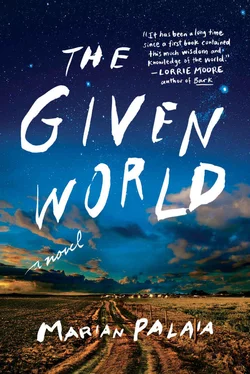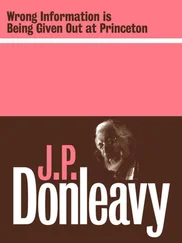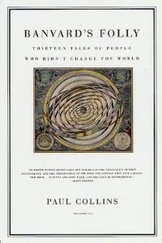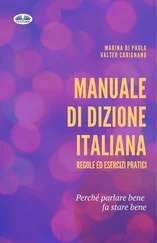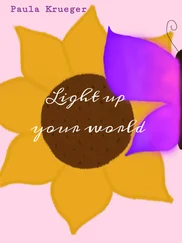A few minutes later: “Remember that time I fell off the roof?”
“Roof?” my mother says. “What?” Meaning, I suspect, Don’t be an idiot, Riley. Of course I do. Or could it be that she really doesn’t remember? I don’t believe it. How effortless, though, for me to be clueless and seven, nine, ten again. As if I could take us all back to that picture-perfect existence. And by “all,” I do mean all four of us. This is a trick I have been working on since I was a teenager, a poster child for the seventies. It’s amazing I remember anything. But I did, goddamn it, have a brother. He was not one of my frequent hallucinations or one of the flashbacks I was promised. And, no, I don’t have those anymore. They too have passed their expiration date.
My feet reach for Cash under the table, but of course he is not here. I feel an imprint though. An outline. Some residual dog warmth. “Roof roof,” I say. My parents look at me. My mother nods. I see the corners of her mouth think about smiling. Dad just goes ahead and does it. Rufely.
Mom’s hair is straight and long and pure white. It is lovely, as she is. She bites the ends sometimes; it is a signal that she is flighty, as in liable to fly. I see just the smallest, moon-sliver curve of ear peeking out. I reach over slowly and touch it. I can’t help it. She stays perfectly still, a bit taken aback, frightened even, at having been snuck up on like that; then relieved, or released, when I pull my hand away.
They have already restarted my father’s heart once, brought him back to the land of the living, so he can play Scrabble with us in the kitchen. One night after a game he pulls letters from the board, and on the red-faded-to-pink Formica table spells, “D-o n-o-t r-e-s-u-” and then hesitates, his long, battered fingers spidering between an s and a c . Mom helps him finish it, and with letters of her own, and a few she steals from Dad, spells “gone so gone.” I try not to wonder what it means, and do not enter into this braille-like conversation, as I have clearly not been invited in. It is almost as if I am not here.
I recognize that they are trying to make a place for me, for my actual body, but there will be times it will not seem worth the effort, and my role will be to witness. Whatever comes next. I do realize I’ve had my chances.
If I had been listening, and reading her letters more carefully, I might have at least sensed something coming. One letter told about waves crashing against the front door. In another, she was trying out names for all the itinerant ground squirrels and gophers, voles, mice, and wood rats: Smokey, Clarence, Ophelia, Sparky (Smokey’s evil twin), George. And on the phone, when the conversation faltered, or strayed into dangerous territory (disappearing acts, family), she would tell me who was at the bird feeder, or in the horse trough turned birdbath.
“Magpie,” she would say. “Drowning feathers.” “Baptismal finch.” Lone geese worry her, up there honking like sonar, waiting for that twin sound, that echo in another’s voice, to return to them. They worry me too. I remember daily the source of my echo, in every cell. And I remember, as if I had actually been there, Leonard on a wild-goose rescue, going through the river ice. The current grabbing his boots and pulling him in, where he skimmed the undersurface like a shadow. Like a big sturgeon, Darrell said, even though he had never seen one of those.
I asked him, not right away, but later: a recalcitrant challenge. I was like that then.
“How do you know?” I demanded.
“I can imagine,” he said, not wanting to argue, obviously, but knowing I did. I often wonder what he could have loved about me, or wonder if maybe, after all, he only wanted to take care of me, a mission I would not have wished on anyone at the time. I wonder how we would find each other now. If our boy has been given a real name. I really ought to know. No one needs to tell me that.
Mick’s motorcycle is in the barn. Exactly where he left it, up on blocks, though the canvas tarp looks suspiciously new. I wonder how many of those my father has replaced, laid over the bike and pinned down with the same water-smoothed, calf-skull-size stones my brother chose so carefully and hauled back from the river in 1966. The wheels still hang on the walls, the tires completely dried out, brittle as shed snakeskin.
I remember enough about motors to get it started, take the wheels to town for new rubber. Mick taught me to ride a long time ago, so long now that I stall her once or twice before we are out on the road, and then it is all I can do not to twist the throttle full on and just wait for the road to turn. But I know I have to baby her, or she’ll die, and my brother’s reincarnation, in whatever form, will have my ass if that happens.
When I get back after the first ride, I see that my mother has fastened a helmet to the porch rail. I undo its strap, hold it up to inspect it, thinking for a second it might be my old one, but then remember mine was red, and smaller. This one is black, with an American flag decal, upside down, on the back. Clearly Mick’s. I am not putting it on my head. I will get a new one. I forgot I had promised him to never ride without one.
I had also promised to never drink more than I could handle, not to do drugs other than smoke pot, never sleep with anyone I didn’t at least think I was in love with. Since I was too young at the time to even be able to imagine doing any of those things, it was easy to say yes. I promise. Swear on the moon. The helmet, at least, I can do something about.
Every night after my parents have gone to bed, I get a beer and go outside, stretch out on my back in the prickly grass, and wait for full dark. It takes a long time, but it is worth it. Even with the new houses, there is almost no ambient light here, and I can clearly distinguish so many individual stars it makes my head spin. The Milky Way appears painted on. It is as sharp, as delineated, as the stripe on a skunk. It is harder to pick out the constellations, with so many minor players swarming the stage. But I do at least still remember where to look for a lot of them, as I had two authorities to teach me: first Mick and then Darrell. Between the two of them, I got several versions each of the same arrangements. My eyes stray habitually to where the Pleiades will appear when they come back around in the fall. Darrell called this group the Seven Sisters, or Dancing Girls, but he told me, too, that in tribal legend they are orphan boys, abandoned at birth. Blue stars — there are thousands of them in just the one cluster, but only six are clearly distinguishable to the naked eye from this little planet. One of the sisters is missing, and there are various theories as to her whereabouts. These stars might also, as far as some ancient Greek poet was concerned, be a flock of doves. This, according to Mick. There is another group nearby, the Hyades, meaning “piglets.” I love that. But I keep thinking about those boys and hating that word, “abandoned.” It seems so judgmental, as if someone did it on purpose. As if she had a real choice.
The last time I looked, his eyes were blue, but they told me all babies’ eyes are blue at first, and that if they are going to change color, they do it over time. Aside from his eyes, whatever color they turned or stayed, he did not really resemble a white person — certainly not me — very much at all. He was a burnt-umber baby, with a little Where the Wild Things Are nose, and his hair was amazing: thick and black when he came to us, six weeks early and small enough to hold, like a drink of cold creek water, in two cupped hands. Darrell was gone by then, of course, so I couldn’t introduce them.
There are no farm animals anymore, save a whole new generation of frenetic and mangy barn cats. I want to remember to ask if they still call the cats Slick and Slim, interchangeably, just for the hell of it. I have to believe that calling the baby Slim started with me, although it could very well have been my dad, clumsily and chivalrously trying to take some of the pressure off. Even for the few weeks I tried to convince myself I could keep and raise him, I was afraid to give him a real name, afraid of what that would mean. Or afraid I would give him the wrong one. I knew that Darrell should be the one to do it, but I couldn’t even tell him. I probably wrote the letter six or seven times, but it didn’t seem right. It seemed cruel, where he was going, and it also seemed like he might ask me to at least try. I couldn’t chance it. I think I must have known all along.
Читать дальше
